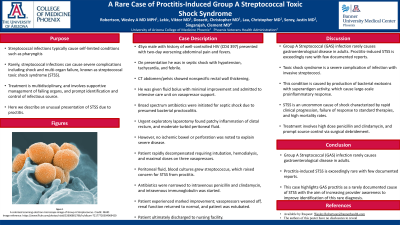Sunday Poster Session
Category: Colon
P0267 - A Rare Case of Proctitis-Induced Group A Streptococcal Toxic Shock Syndrome
Sunday, October 27, 2024
3:30 PM - 7:00 PM ET
Location: Exhibit Hall E

Has Audio

Wesley A. Robertson, MD, MPH, MPA
Banner University Medical Center
Phoenix, AZ
Presenting Author(s)
Wesley A.. Robertson, MD, MPH, MPA1, Viktor Lekic, MD1, Christopher Dossett, MD1, Christopher Lau, MD1, Justin Seroy, MD2, Clement Singarajah, MD2
1Banner University Medical Center, Phoenix, AZ; 2Phoenix VA Health Care System, Phoenix, AZ
Introduction: Toxic shock syndrome is a severe complication of infection with invasive streptococci.
Streptococcal infections typically cause self-limited conditions such as pharyngitis, however can rarely cause severe infection including shock and multi-organ failure, known as streptococcal toxic shock syndrome (STSS). This condition is caused by production of bacterial exotoxins with superantigen activity, which cause large-scale proinflammatory response. Treatment is multidisciplinary, and involves supportive management of failing organs, and prompt identification and control of infectious source. Here we describe an unusual presentation of STSS due to proctitis.
Case Description/Methods: A 45yo male with history of well-controlled HIV (CD4 397) presented with two-day
worsening abdominal pain and fevers. On presentation he was in septic shock
with hypotension, tachycardia, and febrile. CT abdomen/pelvis showed nonspecific rectal wall thickening. He was given fluid bolus with minimal improvement and admitted to intensive care unit on vasopressor support. Broad spectrum antibiotics were initiated for septic shock due to presumed bacterial proctocolitis. Urgent exploratory laparotomy found patchy inflammation of distal rectum, and moderate turbid peritoneal fluid. However, no ischemic bowel or perforation was noted to explain severe disease. Patient rapidly decompensated requiring intubation, hemodialysis, and maximal doses on three vasopressors. Peritoneal fluid, blood cultures grew streptococcus, which raised concern for STSS from proctitis. Antibiotics were narrowed to intravenous penicillin and clindamycin, and intravenous immunoglobulin was started. Patient experienced marked improvement; vasopressors weaned off, renal function returned to normal, and patient was extubated. Patient ultimately discharged to nursing facility.
Discussion: Group A Streptococcal (GAS) infection rarely causes gastroenterological disease in adults. Proctitis-induced STSS is exceedingly rare with few documented reports. STSS is an uncommon cause of shock characterized by rapid clinical progression, failure of response to standard therapies, and high mortality rates. Treatment involves high dose penicillin and clindamycin, and prompt source control via surgical debridement. This can be difficult when a classic infectious etiology is not apparent. This case highlights GAS proctitis as a rarely documented cause of STSS with the aim of increasing provider awareness to improve identification of this rare diagnosis.
Disclosures:
Wesley A.. Robertson, MD, MPH, MPA1, Viktor Lekic, MD1, Christopher Dossett, MD1, Christopher Lau, MD1, Justin Seroy, MD2, Clement Singarajah, MD2. P0267 - A Rare Case of Proctitis-Induced Group A Streptococcal Toxic Shock Syndrome, ACG 2024 Annual Scientific Meeting Abstracts. Philadelphia, PA: American College of Gastroenterology.
1Banner University Medical Center, Phoenix, AZ; 2Phoenix VA Health Care System, Phoenix, AZ
Introduction: Toxic shock syndrome is a severe complication of infection with invasive streptococci.
Streptococcal infections typically cause self-limited conditions such as pharyngitis, however can rarely cause severe infection including shock and multi-organ failure, known as streptococcal toxic shock syndrome (STSS). This condition is caused by production of bacterial exotoxins with superantigen activity, which cause large-scale proinflammatory response. Treatment is multidisciplinary, and involves supportive management of failing organs, and prompt identification and control of infectious source. Here we describe an unusual presentation of STSS due to proctitis.
Case Description/Methods: A 45yo male with history of well-controlled HIV (CD4 397) presented with two-day
worsening abdominal pain and fevers. On presentation he was in septic shock
with hypotension, tachycardia, and febrile. CT abdomen/pelvis showed nonspecific rectal wall thickening. He was given fluid bolus with minimal improvement and admitted to intensive care unit on vasopressor support. Broad spectrum antibiotics were initiated for septic shock due to presumed bacterial proctocolitis. Urgent exploratory laparotomy found patchy inflammation of distal rectum, and moderate turbid peritoneal fluid. However, no ischemic bowel or perforation was noted to explain severe disease. Patient rapidly decompensated requiring intubation, hemodialysis, and maximal doses on three vasopressors. Peritoneal fluid, blood cultures grew streptococcus, which raised concern for STSS from proctitis. Antibiotics were narrowed to intravenous penicillin and clindamycin, and intravenous immunoglobulin was started. Patient experienced marked improvement; vasopressors weaned off, renal function returned to normal, and patient was extubated. Patient ultimately discharged to nursing facility.
Discussion: Group A Streptococcal (GAS) infection rarely causes gastroenterological disease in adults. Proctitis-induced STSS is exceedingly rare with few documented reports. STSS is an uncommon cause of shock characterized by rapid clinical progression, failure of response to standard therapies, and high mortality rates. Treatment involves high dose penicillin and clindamycin, and prompt source control via surgical debridement. This can be difficult when a classic infectious etiology is not apparent. This case highlights GAS proctitis as a rarely documented cause of STSS with the aim of increasing provider awareness to improve identification of this rare diagnosis.
Disclosures:
Wesley Robertson indicated no relevant financial relationships.
Viktor Lekic indicated no relevant financial relationships.
Christopher Dossett indicated no relevant financial relationships.
Christopher Lau indicated no relevant financial relationships.
Justin Seroy indicated no relevant financial relationships.
Clement Singarajah indicated no relevant financial relationships.
Wesley A.. Robertson, MD, MPH, MPA1, Viktor Lekic, MD1, Christopher Dossett, MD1, Christopher Lau, MD1, Justin Seroy, MD2, Clement Singarajah, MD2. P0267 - A Rare Case of Proctitis-Induced Group A Streptococcal Toxic Shock Syndrome, ACG 2024 Annual Scientific Meeting Abstracts. Philadelphia, PA: American College of Gastroenterology.
